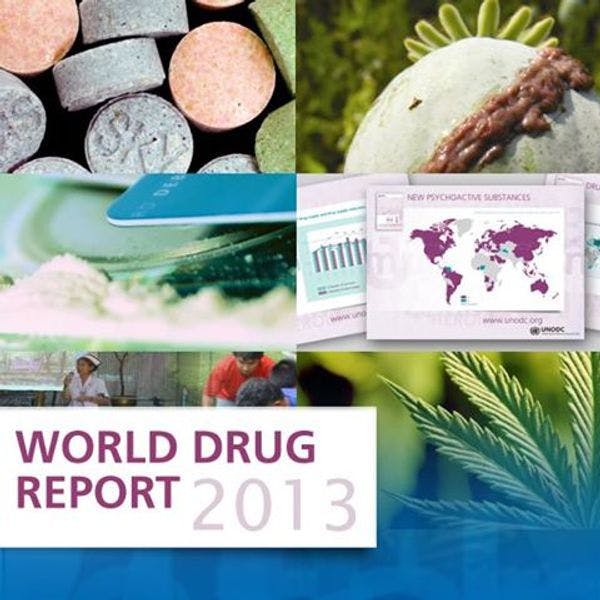Launch of the UNODC World Drug Report 2013 – Between “holy war” and “holistic policy”
The distinct sound of circling wagons characterized the rhetoric at the launch of the 2013 World Drug Report on Wednesday 26th June, as speakers from the United Nations Office on Drugs and Crime (UNODC), the Commission on Narcotic Drugs (CND) other high level organizations referenced recent cracks in the UN drug control regime, including the report of the Organization of American States (OAS) and various national and local measures to legalize and regulate the sale and use of cannabis. The session was a dizzying whirlwind of words such as terrorism, trafficking, democracy, suffering, new psychoactive substances, and human rights, a phrase that came up more than twelve times in the various presentations (after that I lost count). Yet given all the pious references to the fact that the drug control treaties are based on the principles of health and human rights, only one speaker, James Ugala from Ghana, mentioned harm reduction in the context of “holistic policy.” The Iranian delegate was more forthcoming, calling the fight against drugs a “holy war” mentioning that “it” had “cost” more than 3600 Iranian lives last year.
While the report struck a self-congratulatory note mentioning that world drug use had “stabilized” at 27 million “problem users,” giving statistics on seizures and alternative development programs, alarms were sounded at the growing global use of new psychoactive substances that are not regulated by the drug control conventions. Speaker after speaker reiterated this fact, discursively blurring it with the massive harms to democracy and development perpetrated by global trafficking – the word “mafia” came up a lot – and corruption, all framed by the mantra of shared responsibility. While it may have been my imagination, some delegates seemed to be laying the rhetorical groundwork for a new global convention on psychoactive substances.
The Russian representative, Mr. Ivanov, attacked the report for its failure to mention the devastating impact of illicit Afghan opium production on the Eurasian region, which, he said, was the “defining factor in political destabilization in Eurasia that was obvious to whole world.” He suggested that “implementation of current political action plan threatened to be a debacle” if the CND did not pay more attention to the situation in Eurasia, citing alternative development for Afghan poppy farmers as the “appropriate remedy” that ECOSOC should apply. For his part, the Afghan representative said that treatment programs and alternative development were working in the provinces where there was sufficient US and UK aid and food programs, but that deep poverty and political instability gave the Taliban a free hand to encourage farmers to grow poppy for the world market. Sergei Lebedev, ED of the Commonwealth of Independent States recommended the Russian Federation’s policy of forcing all people dependent on drugs into “treatment” and confiscating the property of drug dealers to the assembly at large.
INCB President Raymond Yans mentioned access to essential medicines for “relief of pain and suffering” four times in his five minute speech, but spoiled the moment by intoning the words “control” and “abuse” at least thirty times. Predictably Yans condemned the US states’ that are legalizing recreational cannabis use, which he said “was in grave contravention of the drug control conventions.” How this position squares with the cited toll on democracy taken by illegal drug use and trafficking was baffling.
Michel Perron of the Vienna NGO Committee (VNGOC), was a voice of sanity, highlighting the overdose prevention and HIVAIDS resolutions brought by NGOs at the 56th CND and recommending a three point plan of action to include NGOs in the 2014 high level assessment and the 2016 UN General Assembly Special Session on drugs (UNGASS). He called on member states to earmark a portion of their annual contributions to UNODC for NGO specific activities, concluding his remarks with the statement that “the CND is the body vested with the fiduciary and policy authority and by extension – accountability – to get it right. Getting it right cannot be done by governments alone and we (civil society) look forward to contributing to your mandate.” A full report on the meeting is forthcoming.
Topics
Regions
Related Profiles
- International Association for Hospice & Palliative Care (IAHPC)
- International Drug Policy Consortium (IDPC)
